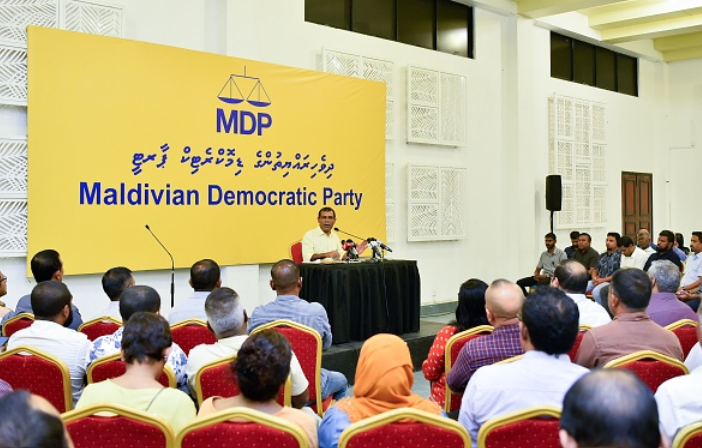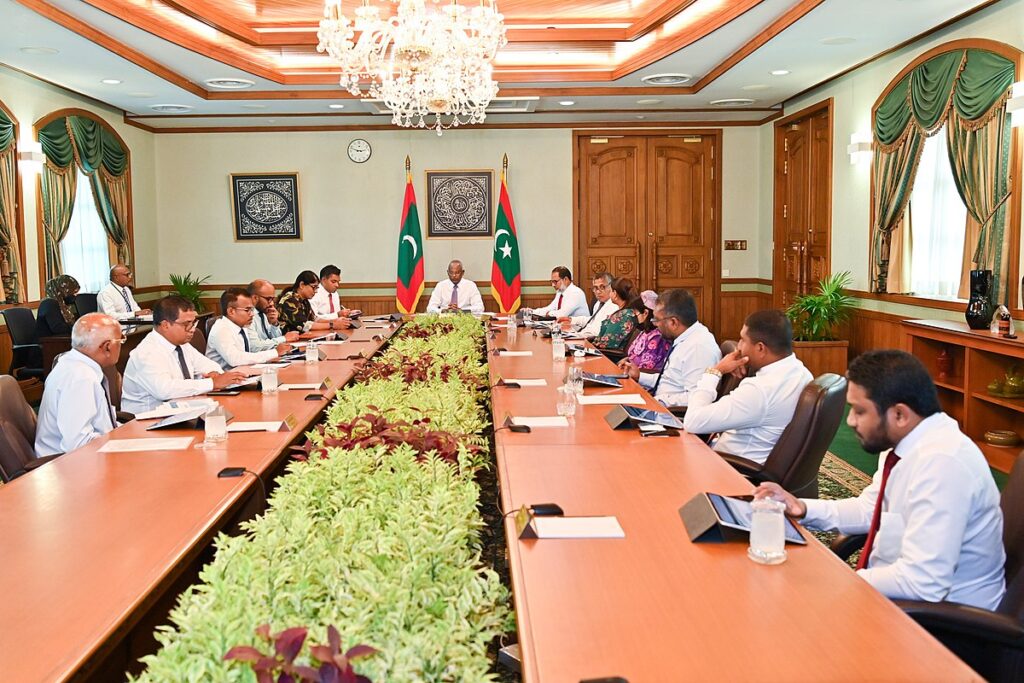
In May 2023, Indian Defense Minister Rajnath Singh made a three-day visit to the Maldives to further deepen India’s defense cooperation with the archipelago, arguably to counter Chinese influence. While China and the Maldives have enjoyed warm relations since the establishment of their diplomatic ties in 1972, current political developments underscore the fact that China may be losing ground in the country.
Good relations with the Maldives help China protect its Sea Lines of Communication, access the Indian Ocean, and challenge India’s presence and influence in the region. On the other hand, Maldivian leaders have often acknowledged the importance of Beijing for the country’s development, economic growth, investments, tourism, and display of agency vis-à-vis India. Essentially, subsequent Maldivian governments have made choices on the extent of their engagement with China, without antagonizing or alienating it completely.
As the Maldives heads into Presidential elections this September, a lot is at stake for China. With an increase in mainstream parties advocating for friendly relations with India due to the split in the ruling Maldivian Democratic Party (MDP) and a leadership crisis within the opposition, China is quickly losing its political capital and influence in the island nation.
China in the Maldives: The Story So Far
Former president Maumoon Gayoom (1978 – 2008) of the Maldives laid the foundation for contemporary Maldives-China relations. Despite having maintained a pro-Indian foreign policy, he was the first Maldivian President to visit China in 1984 and again in 2006. However, Chinese presence and influence in the archipelago was largely limited during his years. Relations focused on technical and economic cooperation, visa provisions, and project contracting. Beijing had invested in housing projects, drainage, and road projects worth around USD $46 million, and trade between both countries accounted for a mere USD $2.8 million.
As the Maldives heads into Presidential elections this September, a lot is at stake for China.
In the lead-up to the first democratic elections in 2008, Mohammed Nasheed, the leader of the MDP, criticized Gayoom for cozying up to China. After being elected as President, Nasheed put forth an “India First” policy to respect Indian concerns and interests. Nasheed’s policy was shaped by two factors: the MDP and a newly democratic Maldives looked upon India as their role model; and second, there was appreciation and understanding of the Maldives’ reliance on India for security, defense, economy, and development. This policy was, in turn, reciprocated by India’s increasing development and defense assistance. The MDP government also prevented other countries from investing in strategic assets like seaports and airports. That said, Nasheed continued to maintain minimal relations with Beijing. New MoUs were signed with China for housing projects and tourism, and China also opened its embassy in Male during this presidency.
However, China had its breakthroughs in the Maldives only after Nasheed’s resignation in 2012. During his brief stint, Mohammed Waheed (2012 – 2013) sought a USD $500 million loan from China for housing projects. His visit to China underscored an attempt to increase trade and tourism between both countries. China’s roots in the Maldives further deepened under the presidency of Abdulla Yameen (2013 – 2018) of the Progressive Party of Maldives (PPM). During this time, the Maldives joined the Belt Road Initiative, borrowed unsustainably and unconventionally from China (USD $1.5 to 3 billion), and passed new laws that allowed foreigners, including Chinese nationals, to own lands. China and the Maldives also signed new mega-infrastructure projects and investments, a Free Trade Agreement, and decided to build an observatory post in the Indian Ocean. In his later years, Yameen openly advocated for Chinese presence at the cost of Indian interests and sensitivities. China’s indifferent approach towards the Maldives’ corruption, democratic backsliding, arrest of opposition leaders, and emergency declaration further cemented its relationship with Yameen.
On the other hand, China’s support to Yameen had impelled the MDP more towards India. With the MDP-led coalition coming to power in 2018, the relationship with Beijing is again reduced to the bare minimum. President Solih’s “India First” policy increased India’s engagements in the country via high-impact community development projects, mega-infrastructure development projects, and defense cooperation. But the MDP has not antagonized China either. The incumbent government is cooperating with Beijing on issues like the energy sector, desalination plants, sports, infrastructure projects, etc., albeit keeping Indian sensitivities and concerns in mind.
Domestic Developments
Increasing factionalism since 2018 has split the ruling MDP into two parties. Beginning in 2018, Solih and Nasheed tussled over various issues, such as the parliamentary system, hate-speech law, and the inability to crack down on corruption and fulfill electoral promises. Nasheed’s criticism of the government’s policy towards the Chagos further exacerbated the fault lines. His urge to contest the elections despite his defeat in the primaries against Solih ultimately compelled him and his loyalists to create the new party – the Democrats.

On the other hand, Yameen’s imprisonment has led to a crisis of legitimacy and factionalism in the pro-China Progressive Alliance (PPM and People’s National Congress). In 2019, Yameen was arrested on multiple charges of money laundering. After a brief acquittal, he was arrested again in December, 2022. And despite being detained, Yameen alone has led the opposition alliance for the past four years and continues to exercise a strong hold over the party. As a result, his loyalists and senior leaders have continued to bet on him for the upcoming elections. This is despite Yameen’s ineligibility to contest till the court finds him innocent. However, some members within the party are also seeking a plan B, which is triggering more divisions.
Implications for China
These political changes are significantly impacting China’s foothold in the country. The split in the ruling party has increased the number of mainstream parties prioritizing relations with India and has enhanced to the volume of advocacy for friendly relations with India. Leaders of both the parties have prioritized Indian security and sensitivities over China. In the past, they have defended Indian investments and criticized the India Out movement, a campaign launched by the Progressive Alliance and supported by China to muster nationalist sentiments against the government and push back against India’s increasing influence and defense cooperation with the Maldives.
Indian initiatives have also promoted local development and economic gains that could offer electoral benefits for the government, since India provides infrastructure and investments that are less risky than those brought in by China. With the MDP going into presidential elections and the 2024 parliament elections, they will continue these Indian projects to promote a win-win cooperation. Essentially, there are fewer incentives for the MDP to alienate a friendly India and embrace a risky partnership with China.
China’s influence will be challenged with the MDP’s victory; Yameen’s ineligibility to contest in elections; and the Progressive Alliance’s split, or alliance with the Democrats.
The Democrats, whose ideological tenets evolve from the MDP, will also continue to support India in the future. Over the years, China’s support for Yameen and its turning a blind eye to his anti-democratic crackdown has turned Nasheed into a strong critique of China. He has often accused China of debt trapping and promoting non-democratic procedures, investments, and lending. He continues to criticize the opposition’s India Out campaign for being irrational and has consistently pushed for a robust relationship with India.
On the other hand, the pro-China Progressive Alliance’s leadership crisis and factionalism has further put China at a loss. With Yameen’s absence, the alliance lacks a strong leader and is at risk of a further split. Essentially, they are hoping to seek legitimacy and have an upper hand against Solih by hoping to form an alliance with the Nasheed’s Democrats, for which abandoning the India Out campaign remains a pre-condition. This pressure has likely triggered the Progressive Alliance to not (yet) mention India in their latest nationalistic campaign.
Conclusion
These political developments will have a significant impact on Beijing’s position in the country. China’s influence will be challenged with the MDP’s victory; Yameen’s ineligibility to contest in elections; and the Progressive Alliance’s split, or alliance with the Democrats. The only scenario that Beijing would benefit is from Yameen being eligible to contest in elections and being capable of limiting factionalism in his party.
This is not to suggest that Beijing has lost all of its leverage in the country. Its lending, economy, tourism, investments, and trade continue to provide significant leverage for China. But there is less space for China’s diplomatic maneuvers if the next Maldivian government embraces a minimalist interaction with China and chooses alternative Indo-Pacific partners to deter any Chinese misadventures. Also, China will hesitate to completely lose out on the Maldives due to its strategic and geopolitical importance in the Indo-Pacific. Beijing will thus re-calculate and recalibrate its approach to the new realities in the country. Whereas for the moment, it seems to be at the losing end.
Also Read: Will ‘The Democrats’ Reconfigure the Maldives’ Political Landscape?
***
Image 1: MDP via Getty Images
Image 2: Ibrahim Mohamed Solih’s cabinet meeting via Wikimedia Commons


